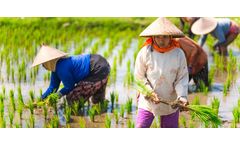Refine by
Drought Articles & Analysis
228 articles found
By modifying genes responsible for traits such as drought resistance or pest tolerance, researchers can develop crops that are more resilient to environmental challenges, ultimately enhancing food security. ...
Applications in Agricultural Research Accurate quantification of unsaturated fatty acids is crucial in understanding stress responses in crops. Under drought or cold stress, plants often alter the degree of fatty acid unsaturation to maintain membrane fluidity. ...
Abscisic Acid (ABA): Known for its role in stress responses, ABA is important in regulating stomatal closure to prevent water loss during drought conditions. It also induces seed dormancy and inhibits germination under unfavorable conditions, helping plants to adapt to environmental stress. ...
During the 2023 growing season, Mr. Steven Deitz, a research consultant with Sawtooth Ag Research (Selma, CA) conducted a field study using a new ROS mineral oxychloride disinfectant, JC 9465, to control sour rot in mature (6 years old) wine grapes (cv. French Columbard) vineyard. The test site (vineyard) had a history of virus infections that showed symptomology late in the season when under ...
Cattlemen are increasingly turning to bagged silage for flexible feed management. The most fundamental beef cow feeding strategy remains the use of pasture, which is considered the lowest-cost feed resource. Therefore, many cattle operations aim to maximize pasture time annually to benefit from labor, manure management, physical activity, and nutrition advantages. ...
Moreover, biochar's ability to increase crop yields and improve resilience to drought or disease translates to higher profitability for farmers in the long run. ...
When plants face challenges such as pathogen attacks, herbivory, drought, or salinity, plant hormones initiate defense responses that can mitigate damage and enhance survival. ...
This is particularly beneficial in arid and semi-arid regions prone to drought. d. Promoting Circular Economy Practices Biochar production utilizes agricultural waste, turning it into a valuable resource. ...
This feature is particularly beneficial in regions facing water scarcity or those prone to drought. By improving water retention, biochar helps crops endure dry periods, leading to a more resilient agricultural system. ...
Nevertheless, in many regions, farmers face prolonged droughts or have limited access to water sources, which directly impacts their ability to produce food efficiently. ...
Responding to Environmental StressSUMO modification plays an important role in plant responsing to environmental stress, such as drought, salt stress, and temperature changes.2. Regulating Growth and DevelopmentSUMOylation participates in several stages of plant growth and development, such as flower development, seed development, and germination.3. ...
The grain leader delivers millions of tonnes of quality Australian grain into the hands of customers around the world each year. Business challenge With drought-breaking rainfall and improved seasonal conditions, the customer wanted to prepare for a bumper crop season. ...
Additionally, cytokinin is known to improve stress tolerance in plants, making them more resilient to adverse environmental conditions such as drought, heat, and cold. This is particularly important in regions where weather patterns are unpredictable or prone to extremes, as it can help to ensure that crops continue to thrive even in challenging conditions. ...
This prevents them from leaching out of the soil and polluting waterways. https://www.bestongroup.com/biochar-use-in-agriculture-and-farming/Water Conservation Champion: Biochar's porous structure increases the soil's water holding capacity. This is a lifesaver in drought-prone areas, allowing crops to thrive with less irrigation.Soil Structure Superhero: Biochar improves soil ...
The provinces of Alberta and Saskatchewan have struggled with droughts and water shortages for the last three years, and this year, the world is being hit with El Niño, which is causing the driest winter in seven years. ...
Water Management: Biochar improves soil water retention capacity, reducing irrigation requirements and enhancing drought tolerance in plants. Its porous structure allows for better water infiltration and drainage, reducing soil erosion and runoff. ...
Early Warning Systems: Weather stations play a crucial role in early warning systems for weather-related disasters such as droughts, floods, and storms. By monitoring weather trends and issuing alerts, weather stations help farmers prepare for and mitigate the impacts of extreme weather events. ...
ByJXCT
Development of this system has also been supported by Cal Fire grants with the goal of building pilot infrastructure to help incentivize and monetize Cal Fire’s forest and wildfire mitigation.The ongoing drought and other climate changes affecting the vast woodlands across California have resulted in unprecedented fire danger. ...
During drought or dry conditions, salinity and pH levels can change quickly in the soil. ...
Additionally, cytokinin is known to improve stress tolerance in plants, making them more resilient to adverse environmental conditions such as drought, heat, and cold. This is particularly important in regions where weather patterns are unpredictable or prone to extremes, as it can help to ensure that crops continue to thrive even in challenging conditions. ...














